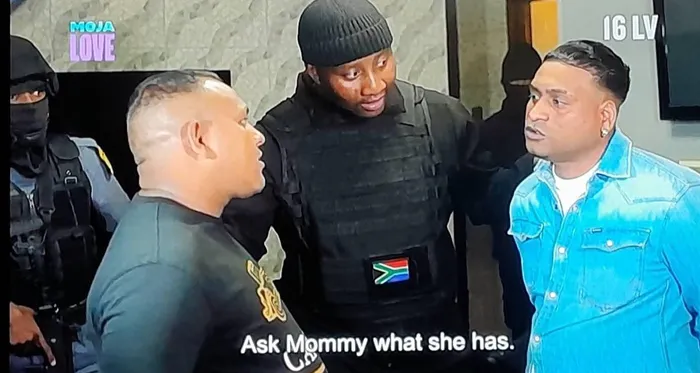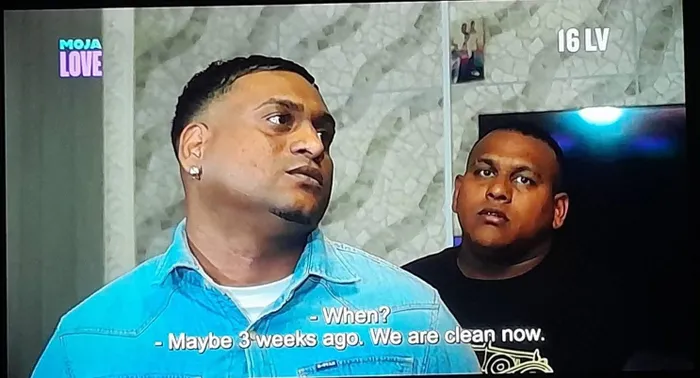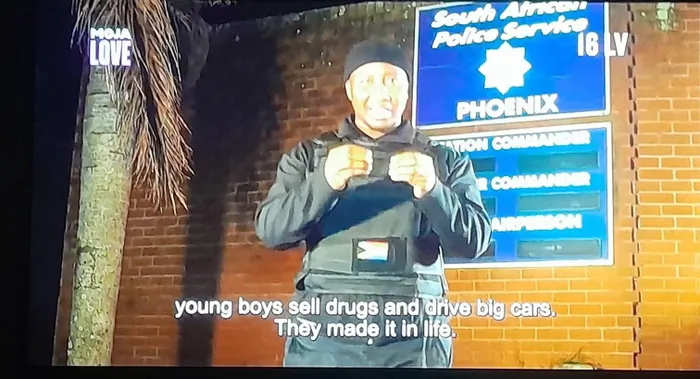Phoenix brothers caught 'red handed' in 'Sizokthola' live television drug raid
'It is hard to cry foul when the evidence is found in your house'

A screenshot of Sizokthola shows brothers, Preneshen and Preshen Ramsagar, and the show's host, Xolani Khumalo (centre), during the drug raid.
Image: Social media: Sizokthola
AFTER appearing on a South African crime series, a Phoenix family claimed they endured police brutality during a live drug raid, leading to community backlash and severe emotional distress.
Brothers Preneshen Ramsagar, of Umhlanga, and Preshen Ramsagar, of Phoenix, were charged with dealing in drugs, alleged to be rock and cocaine soon after the raid.
They appeared in the Phoenix Magistrate’s Court and were released on R5 000 and R3 000 bail respectively.
The brothers and their father, Rajesh Ramsagar, featured in an episode of Sizokthola, a show hosted by Xolani Khumalo and aired on DStv in June. The show features notorious drug dens and alleged drug kingpins being raided in small communities across the country where drugs are rife.
During this episode, Khumalo and his team of security guards, and SAPS members raided Rajesh’s home in Clayfield. They questioned him about the whereabouts of drugs, which they believed were being sold by both the brothers.
After much hesitation, Rajesh pointed to a small quantity of drugs.
When his sons came home, they were questioned by Khumalo and the police about where the drugs were being hidden.

The footage of the show has gone viral on social media
Image: Social media
Preshen told Khumalo that they had “left this game about three weeks ago”, while Preneshen said “I left this game a long time ago”.
Khumalo said he had information that the brothers were dealing in hundreds of thousands of rand worth of drugs.
A woman, who was not named in the video, said she had flushed the rock pieces down the toilet when the team arrived.
During the show's filming, Preneshen and Preshen continued to point out areas where the drugs were stashed. They led the police to another house, where a woman named Shireen took cocaine pieces wrapped in a dress from the wardrobe and handed it to Khumalo.
The last house they led police to was a friend’s home, where they had stored their guns and other drugs. They subsequently handed close to R100 000 in rock and cocaine to Khumalo during the raid.
In an interview with the POST, Preneshen accused police of gross brutality and claimed they were held against their will and tortured for several hours before they were taken to the Phoenix police station and charged.
“My brother and I were at the Rick Ross concert and we received calls from neighbours telling us that police had raided my father’s house and they were breaking his hands.
“We arrived at the house at around 9.30pm. Police cable tied our hands and stripped us naked. They removed the cushions from the sofas and placed our heads inside the frame of the sofa. When we moved, they hit our heads. They took turns to hit us, while asking us for the drugs,” he said.
Preneshen claimed police and security officers used “torture tactics” to try to obtain information from them.

Xolani Khumalo, host of Sizokthola, outside the Phoenix police station during the show's filming
Image: Social media
“They turned us upside down. Our legs were in the air and our heads touched the ground. They then poured water down our nostrils. I felt like I was drowning and suffocating. They hit us with hockey sticks on our buttocks. We were hit in places we cannot openly show to the court. They also put a packet over our heads to suffocate us.
“They opened the packet when we started to froth. My father was hit so badly that two fingers on his left hand broke. His lips were bust and he was hit on his body with a hockey stick. The sofas at his home were torn, doors were damaged and valuables were missing during the raid,” he claimed.
Preneshen also claimed that despite the suspicions of him and his family dealing in drugs, his human rights had been violated by the torture.
“They did not hit us during the filming. When the cameras were off, they assaulted us and forced us to tell them what they wanted us to say. They would then put the camera on and record us while we said what we were instructed to say.
“We were assaulted and taken to different locations to point out where substances were hidden until about 4am. We were implicated in other people’s drug dealings. We agreed because we wanted the assault to stop. The beatings eventually stopped and at 5am. We were at the Phoenix police station and were placed under arrest,” he added.
He said since the show aired, he and his family had been shunned by the community.
“People have recognised us and we cannot even leave home anymore. Because of the videos that are going around, people stare at us and make comments about us being drug dealers. It is very embarrassing. We had to close down our salon after the show’s airing due to the fact that people thought we were drug dealers and stopped supporting us.
“Our human rights have been violated. The police, who are tasked to uphold the law, were present and turned on us, instead of protecting us.
“If we got caught with drugs, they should have taken us to the police station and arrested us, not torture us for hours. When we were released on bail, we could not walk properly, and had to be taken to hospital straight from court,” he alleged.
KZN police spokesperson, Captain Ntathu Ndlovu, said the Independent Police Investigative Directorate (IPID) was investigating the matter.
Umesh Jivan, former president of the KZN Law Society, said Sizokthola could not be faulted for the airing the drug raid. He said there was no “innocence” involved in the episode, which featured the Ramsagar family, thereby dispelling their claims of not dealing in drugs.
“The show is the same as Checkpoint and The Devi Show, which shows crime in real time. The episode of Sizokthola showed that the searches resulted in finding drugs in various places, like highly priced vehicles.
“Police had reasonable grounds of suspicion and it was proved in the video. Ipid will investigate the claims of torture, but with regards to drug dealing, it is tough to deny.
“They took drugs from the bag, wardrobe and cars when they were asked about where the drugs were kept. You can complain if your privacy is violated if the accusations were false and you were not involved.
“It is hard to cry foul when the evidence is found in your house,” Jivan said.